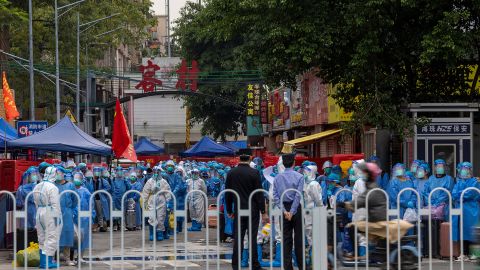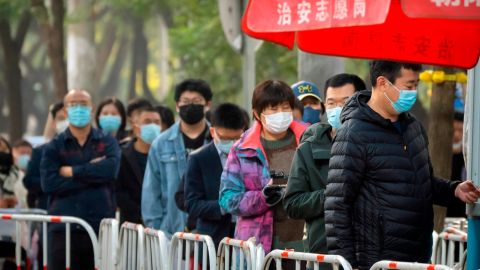Guangzhou lockdown: Chinese are criticizing zero-Covid — in language censors
Hong Kong
CNN
—
In many countries, cursing online about the government is so commonplace nobody bats an eye. But it’s not such an easy task on China’s heavily censored internet.
That doesn’t appear to have stopped residents of Guangzhou from venting their frustration after their city – a global manufacturing powerhouse home to 19 million people – became the epicenter of a nationwide Covid outbreak, prompting lockdown measures yet again.
“We had to lock down in April, and then again in November,” one resident posted on Weibo, China’s restricted version of Twitter, on Monday – before peppering the post with profanities that included references to officials’ mothers. “The government hasn’t provided subsidies – do you think my rent doesn’t cost money?”
Other users left posts with directions that loosely translate to “go to hell,” while some accused authorities of “spouting nonsense” – albeit in less polite phrasing.

Such colorful posts are remarkable not only because they represent growing public frustration at China’s unrelenting zero-Covid policy – which uses snap lockdowns, mass testing, extensive contact-tracing and quarantines to stamp out infections as soon as they emerge – but because they remain visible at all.
Normally such harsh criticisms of government policies would be swiftly removed by the government’s army of censors, yet these posts have remained untouched for days. And that is, most likely, because they are written in language few censors will fully understand.
These posts are in Cantonese, which originated in Guangzhou’s surrounding province of Guangdong and is spoken by tens of millions of people across Southern China. It can be difficult to decipher by speakers of Mandarin – China’s official language and the one favored by the government – especially in its written and often complex slang forms.
And this appears to be just the latest example of how Chinese people are turning to Cantonese – an irreverent tongue that offers rich possibilities for satire – to express discontent toward their government without attracting the notice of the all-seeing censors.

In September this year, US-based independent media monitoring organization China Digital Times noted numerous dissatisfied Cantonese posts slipping past censors in response to mass Covid testing requirements in Guangdong.
“Perhaps because Weibo’s content censorship system has difficulty recognizing the spelling of Cantonese characters, many posts in spicy, bold and straightforward language still survive. But if the same content is written in Mandarin, it is likely to be blocked or deleted,” said the organization, which is affiliated with the University of California, Berkeley.
In nearby Cantonese-speaking Hong Kong, anti-government demonstrators in 2019 often used Cantonese wordplay both for…
Read More: Guangzhou lockdown: Chinese are criticizing zero-Covid — in language censors
